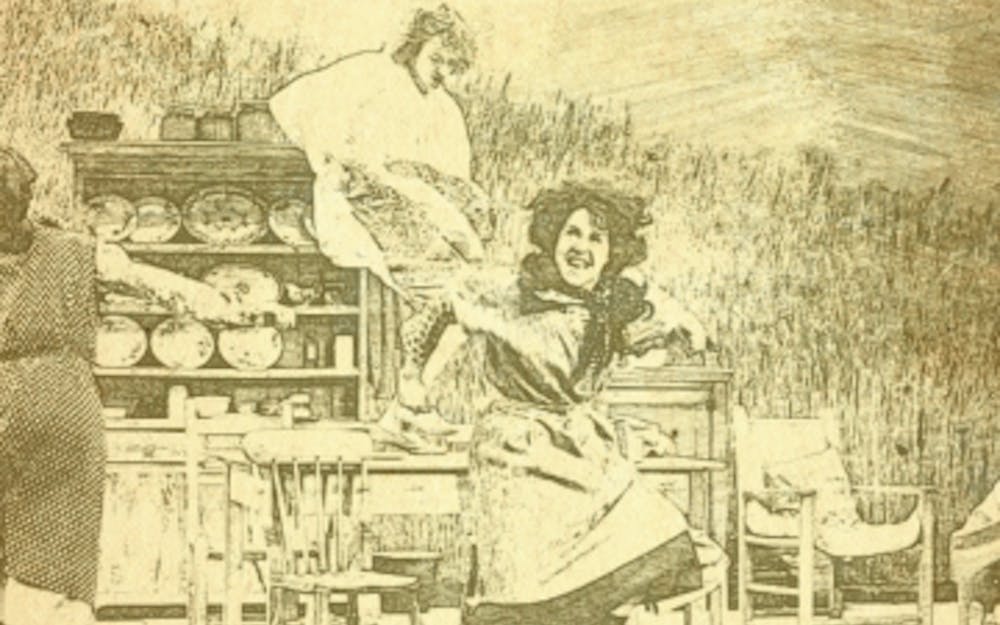The first half of November this year will see the story of “Dancing at Lughnasa” performed on stage.
The director, Ellen Hemphill, a theater professor, recently finished the auditions which were attended by many first-time actors. This two-act Irish play tells the story of a family of five sisters, their brother Jack, the son and narrator Michael and his always-absent father Gerry living in a fictional Irish town called Ballybeg. Weaving dance and music into a classic tale about family dynamics and personal life struggles, the play will provide a feast for the eyes and ears of all audiences.
Hemphill was educated in France and has an artistic background in experimental theater. She has now been at Duke for 25 years, teaching voice, gesture, public speaking, theater and solo performance. Her experience in theater is diverse and comprehensive, as she has taken on all kinds of roles, including director, actress and choreographer. She mainly works with alternative theater but is attracted to “Dancing at Lughnasa” this time due to its historical context, the challenges of having to learn the dialect and its philosophical Chekhovian nature. As domestic women living in a low-income Catholic town, the sisters in the musical constantly need to negotiate the restrictions of social rule and seek out ways to creatively express their personal freedoms and individuality. Their means? Dancing, music, hope.
“The bigger picture is about each sister’s journey and certainly the brother – he comes back from the war [in Uganda] already handicapped or wounded in the sense that he has an illness,” Hemphill said. “So everybody is sort of a wounded creature doing their best.”
This kind of story about human spirit fighting against life’s hardships never gets old, but “Dancing at Lughnasa” is also spiced up by its retelling-from-memory format – an older Michael narrates the show, recalling his childhood events from memory. Perhaps in the face of adversities, he chooses to escape to the innocence of young age and the security and love that family offered. Perhaps he just wants to indulge in the happiness of being able to see the lively Maggie and the naïve and pure Rose again. Or perhaps all the sweet memories are just trickery by his mind to comfort himself. But sometimes these fantasies are worth the risk, aren’t they?
“For me memory is very singular, very interior,” Hemphill said. “You can even have a conversation with a friend about last week, and you’re not gonna have the same memory of that. So for me memory lives in the same part of the brain as a dream.”
This simple story about dreams, passions and humanity should resonate with the Duke community because its theme of identity in relation to family is central to our college experience. In these vital years of our personal development, we look up to our parents and other familial mentors for role models and advice and mature by both relying on and rebelling against family beliefs, values and traditions. As young adults, we are caught in an awkward situation that teeters between independence and individual responsibility that we have to navigate on campus, and the family security and comforts provided by trips home during breaks.
“I always feel that students are pretty attached to their family, very family-centric and talk to their family a lot,” Hemphill said. “And that might even be more so now than it used to be ... I think young people between the age of 18 to 21 are in the process of individuating away from family. So I think every time there is a family story, it relates to young students who are in relation to family still.”
Furthermore, the play will pay special attention to visual and sound design, singing, choreography and dialect coaching. The production will strive to perfect the technical aspects that make a play interactive, engaging and enjoyable.
“Theater is visceral,” Hemphill said. “When you see something live, a dance, theater or music, it hits you. It’s rare that something on your phone does that.”
Get The Chronicle straight to your inbox
Signup for our weekly newsletter. Cancel at any time.

